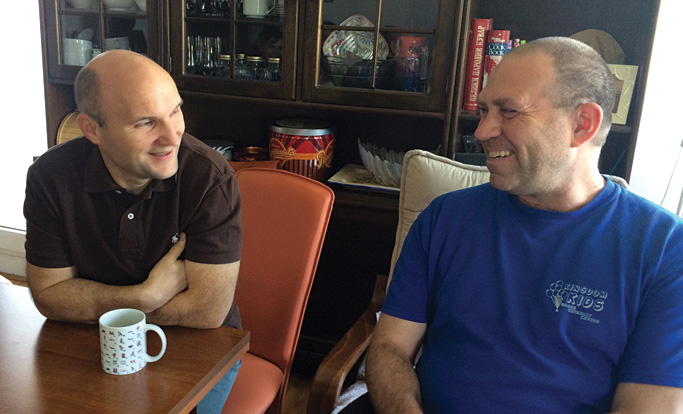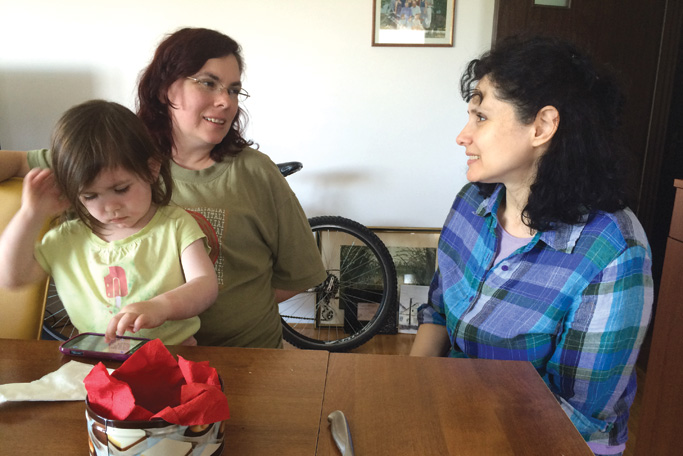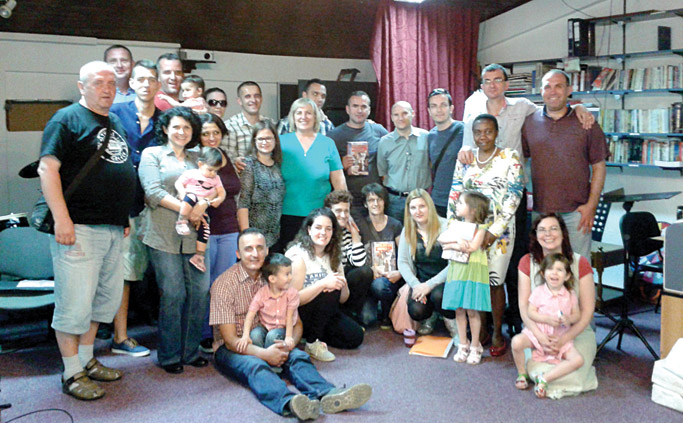Steve and Laura work with the leadership team of one of only five evangelical churches in the country of Montenegro, with a focus on discipling believers, and a vision for growth.

Vladimir Cizmanski and Steve Campbell meet to plan various activities at the church. Photo by Janet Blosser
By Steve Campbell
When Laura and I spent a year serving in Montenegro with tranSend, beginning in 2008, it was the culmination of a long sense of call to overseas mission work. As we discussed our future together while we were dating, it was clear that we wanted to explore the call to make disciples overseas.
Within a year of our active exploration, we began the process of applying with tranSend. In the process, we met two Montenegrin pastors. The call became clear. We had been active in domestic missions work and we were equipped to be church planters.
But instead of planting a church, our sense from the Spirit was to encourage and build the leadership in an already established church. The congregation was about 10 years old. Our tranSend assignment involved working with Pastor Vladimir, a missionary pastor from Serbia who was guiding a Brethren Assemblies church in the capital of Podgorica. As we studied the Serbian language, we became very involved in the congregation, leading Bible studies and assisting with worship. This one-year experience was very formative in our long-term call to missions.
After we returned to the States, we took the Perspectives on the World Christian Movement course. It helped confirm many things we saw and sensed in our tranSend year. Its viewpoints also summed up how we saw our work quite well: being part of incarnational ministry, helping to plant a Balkan church rather than transplanting a Western one, equipping it to produce viable, reproducible churches, all the while making disciples with the goal of leaving the work in the hands of national believers.
As our long-term call to missions took shape, we felt the Spirit guiding us to return to Montenegro in 2012, to again work with Pastor Vladimir at the church and disciple persons in faith.

Laura Campbell, the author’s wife, with daughter Esther, talks with Marijana Cizmanski. Serving on the church leadership team with Vladimir and Marijana, the Campbells use their gifts for discipleship ministry. Photo by Janet Blosser
Discipleship has been our focus for our ministry here in Montenegro. As we reflected on 2 Timothy 2:2, our preference has been to “teach others who can teach others.” At present we are using the Discovery Bible Study method, which uses the same standard questions for the group each week. We open God’s word and read it together, asking “What is God saying to each of us?” The questions are meant to draw us closer to God and to each other. In using this method of Bible study, participants are asked to reach out to others and invite people from their circle of contacts, preferably those who are not yet believers. The original participants then become the teachers. While we don’t mind preaching, teaching, or leading groups, we prefer to train others how to do this.
Because our pastor was busy with administrative details of the work, he didn’t have the time to work on discipleship like we did. As we began the Bible studies the believers kept saying, “No one has taken the time to go through the Bible with us like this.” So we began focusing more on teaching and discipling the believers about God’s word and how to lead a Bible study. The next step will be to invite those in the circle of contacts to the Bible studies. Currently we have three groups that are now led by nationals—one mixed and two ladies groups—and we are leading three groups, with the transition coming soon to co-lead.
Our desire is to introduce Christ and the concepts for his kingdom, and help the church sort out what that looks like in this culture. We see that our being present throughout the year in people’s lives is impacting the local church in a significant way. By being present, we build trust and deepen relationships. Then folks are more willing to be taught and shown how to be and make disciples.
On the church leadership team, we talk a great deal about building a bridge instead of a wall. That means we listen and learn where each of us is working at kingdom-building. For newcomers to the church—or those not yet there—it means identifying and focusing what we agree on and building a bridge to welcome these friends into the relationship, instead of concentrating on where we disagree, making that a barrier to entry. As time goes by, we can talk about differences, but the key is inviting people to come in, building trust and reading the Bible together, so that God can do the work of convicting and correcting.
There are many strengths to relating with the leadership team, such as learning the language and culture, both national and church culture. It also gives us personal connections that can open many doors. If we start relationships with people outside the church, they may ordinarily just see us as Americans, and the relationship has a strain on it because they are not sure about trusting us. But once they meet our national friends, and know we are connected in another way in the culture, it opens the relationship.

The church in Podgorica that Steve and Laura relate to. A number of people pictured have been engaged in discipleship training, including Lazar (seated, holding his son Jacob) and his wife Masha (standing above Lazar, with glasses). Photo courtesy of Steve Campbell
We continually face the challenges of language and culture. Sometimes we say things, but how it is interpreted or translated doesn’t always connect, so we are constantly learning. And we realize we often filter through our own cultural lenses. So sometimes it takes more time of talking and processing to get to the meaning of what we wanted to say. We are grateful for persons in the culture who are our “cultural teachers” and help us in this process.
Our “team” in Montenegro is more than just VMMissions workers. We periodically meet with other American mission “co-workers” from various agencies to talk and process about our common goals of sharing the gospel with Montenegro. Since there are only five evangelical congregations in the country, some of these workers also attend our church. Once a year, we have a national gathering of all the believers (foreign workers and local believers) in Montenegro, which is a great encouragement to all of us.
We are so privileged to be part of God’s team worldwide, to join in bringing God’s kingdom to earth as it is in heaven, and in particular to Montenegro.
Steve serves in Podgorica, Montenegro, with his wife Laura and daughters Ruth and Esther. Their home congregation is Trissels Mennonite Church, Broadway, Va.
